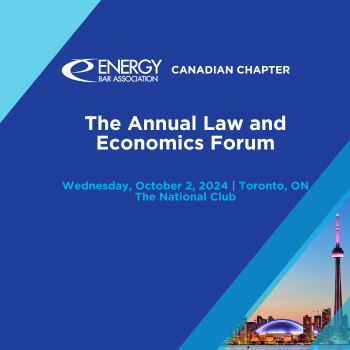
- This event has passed.
Canadian Chapter: The Annual Law and Economic Forum
October 2, 2024 @ 8:30 am – 4:30 pm
The Energy Bar Association’s Canadian Chapter is hosting the second Annual Law and Economics Forum. The theme for the Forum is: Does Climate Change Challenge Require New Perspectives?
Before the Forum, the Canadian Chapter invites all attendees to a Welcome Dinner on Tuesday, October 1. This Welcome Dinner is made possible by the generous sponsorship of Torys LLP and the Canadian Gas Association.
**Registration for this event is now closed**
Tuesday, October 1, 2024: Welcome Dinner
5 PM: Cocktail Hour
6 PM: Dinner
All registrants are welcome to attend the welcome dinner. Speakers for the dinner include Myha Truong-Regan, MBA, Head – Climate Research, Climate Action Institute, Royal Bank of Canada and Bob Heggie, Chief Executive, Alberta Utilities Commission.


Wednesday, October 2, 2024
8:30 AM: Doors open/Coffee and tea available
9:00 AM: Re-thinking Data in the Energy Transition
Climate change related electrification policies together with technological innovation are forcing changes to energy systems in Canada and the United States. These changes are, in turn, driving demand for more and better-quality energy-related data to improve policy, and environmental, regulatory and other societal outcomes as we transition to a low carbon economy. What new data collection and access approaches are needed to ensure the availability of energy data that is relevant, accurate, timely, and reliable?
Speakers Include:
- Bob Heggie, Chief Executive, Alberta Utilities Commission (moderator)
- Wendy Franks, Co-founder and CEO, Canadian Power-to-X Partners Inc.
- Peter Fraser, Energy Consultant, Former Head of Gas, Coal and Power Markets Division, International Energy Agency, and former Vice-President, Industry Operations and Performance, Ontario Energy Board
- Kevin Mancherjee, Director – Operations Descision Support, Ontario Energy Board
- Adonis Yatchew, Professor of Economics, University of Toronto
10:15 AM: Break
10:45 AM: Who Does What in the Transition to a Low Carbon Economy?
Climate change and the transition to a low carbon economy requires the collective action of various parties. Who is responsible for setting policy, identifying and filling policy gaps, implementing policy, making rights determining decisions within the context of policy, establishing whose policy is most relevant to the decision process, undertaking integrated resource planning, and considering the effect on investment? What are the consequences if one or more parties fail to act?
Speakers Include:
- Karen Taylor, Principal, Karen Taylor Consulting, Former Member Ontario Energy Board (moderator)
- Stephen McGrath, K.C., Board member and Chair, Nova Scotia Utility and Review Board
- Jason Chee-Aloy, Managing Director, Power Advisory
- Nicole Martin, Senior Consultant and Board Member, Toronto Hydro
12:00 PM: Lunch
1:15 PM: The Consequences of Stranding the Natural Gas Pipeline System
Climate change and the transition to a low carbon economy are challenging the established legal and economic norms that underly the rate regulation of network utilities, raising the threat of asset stranding in the natural gas sector, requiring massive capital attraction for electric utilities to “electrify everything”, and blurring the distinction between shareholders and customers. What are the consequences of the lack of consensus on net zero versus no carbon emissions, the role of natural gas, and the length of the transition period? Who should decide the approach used to value stranded assets and who should bear the cost – customers, shareholders, and/or taxpayers? What are the consequences on the cost of capital for rate regulated utilities? How will utility services remain affordable? How should regulatory processes be adapted to ensure informed decision making?
Speakers Include:
- Erica Young, Executive Vice President, ENMAX Energy (moderator)
- Chris Russo, VP & Global Energy Practice Leader, Charles River Associates
- Hon. Joe Kelliher, Former Chair, Federal Energy Regulatory Commission
- Brandon Schaufele, Associate Professor, Business, Economics and Public Policy, Ivey Energy Policy and Management Centre
2:30 PM: Afternoon Break
3:00 PM: What do Customers Want?
Per capita energy consumption in Canada and the United States is amongst the highest in the world. Petroleum remains the preferred choice for the transportation sector and natural gas is a preferred primary energy for power generation, space heating, and many commercial and industrial applications. Continued consumer demand for fossil fuels is at odds with climate change aspirations and policies aimed at transitioning to a low carbon economy. What are the consequences of the dichotomy between what customers say they want in relation to climate change and the nature of the energy actually demanded?
Speakers Include:
- Timothy M. Egan, President, Canadian Gas Association (moderator)
- Greg Lyle, President, Innovative Research Associates
4:15 PM: Closing Remarks
| Registration type | |
| Member | $300 CDN |
| Nonmember | $350 CDN |

